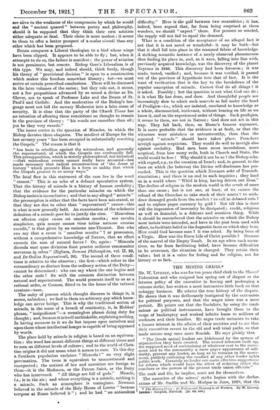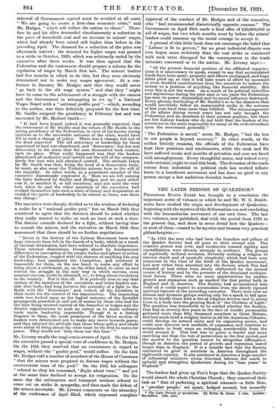THE MINING CRISIS.*
Me. W. LIVESEY, who was for ten years chief clerk to the Miners'
Federation and who resigned last spring out of disgust at the fatuous policy of the executive in forcing and prolonging a ruinous strike, has written a most instructive little book on that unhappy business. He relates the true history of the dispute.
He shows that, it was deliberately instigated by the extremists for political purposes, and that the wages issue was a mere pretext. He points out that the Socialists, by using the trade unions as political instruments, have brought them to the verge of bankruptcy and worked infinite harm to millions of workmen and their families. He urges trade unionists to take a keener interest in the affairs of their societies and to see that their executives revert to the old and well tried paths, so that trade unions may once more flourish. He says plainly that
" The [trade union] leaders are hidebound by the system of organization they have created. The vested interests built up, the supposed need of maintaining at whatever cost to the move- ment and to the community a more paper appearance of soli- darity, prevent any leader, so long as he remains in the move- ment, publicly criticizing the conduct af any other leader in his public work. Certainly no leader can make effective suggestions for reform which would have the effect of reducing either tho numbers or the powers of the present trade union officials."
The rank and file, he implies, must act for themselves.
The narrative of the miners' strike begins with the declar- ations of Mr. Smillie and Mr. Hodges in June, 1920, that the
• The Mining Crisis : if, History and Meaning 10 all Workers. By W. Liveser. London: Simpidn, MarehalL 12E. 6d. act.1 removal of Government ermtrol must be avoided at all costs. " We are going to create a first-class economic crisis," said Mr. Hodges, " which will reduce the nation to chaos." There- fore he and his allies demanded simultaneously a reduction in the price of household coal and an increase in miners' wages, which had already been raised still higher than before in the preceding April. The demand for a reduction of the price was afterwards waived ; the demand for higher wages was pressed to a strike in October, 1920, which was arbitrarily ended by the executive after three weeks. It was then agreed that the Federation and the coalowners should prepare a scheme for the regulation of wages by March 31st last. The miners' leaders had five months in which to do this, but they were obviously determined not to make any wages agreement. At a con- ference in January Mr. Hodges said that they would never " go back to the old wage system " and that they " might have to come to the arbitrament of a struggle with the owners and the Government in attempting to set up " a National Wages Board with a " national profits pool "—which, according to the author, was then definitely proposed for the first time. Mr. Smile resigned the presidency in February last and was succeeded by Mr. Herbert Smith :- " It had been hoped, indeed it was generally expected, that the retirement of Mr. Smillie and the return of Mr. Smith to the acting presidency of the Federation, in view of his known strong opinions as to the inevitable outcome of the crisis, would have led to such a change of policy. There was a change, but not of the kind expected. The old autocracy or leadership by those appointed to lead was abandoned, and democracy,' but not real democracy in the sense that the men themselves took control, took its place. What really happened was that the leaders abandoned all authority and carried out the will of the compara- tively few men who had obtained control. The attitude taken by Mr. Smith was that, being the head of a democratic body, he must, as also must the Yorkshire miners, bow to the will of the majority. In other words, as a prominent member of the executive humorously expressed it, Here we are left nursing the baby fathered by Smillie and Hodges, and we must either rear it, or smother it, or kill ourselves,' and not until the very last, when he and the other members of the executive had worked themselves into such a state of frenzy and desperation as enabled the spirit of leadership to be reborn in them, was there any change."
The executive were sharply divided as to the wisdom of declaring a strike for a " national profits pool," but on March 18th they contrived to agree that the districts should be asked whether they really wanted to strike on such an issue at such a time. The district councils declared for a fight, without having time to consult the miners, and the executive on March 24th then announced that there should be no further negotiations.
" Never in the history of the Labour Movement have such huge interests been left in the hands of a body, which as a result of internal dissensions, had been reduced to absolute impotence. These internal dissensions, brought about by fundamental differences in conception of the proper duties and sphere of action of the Federation, coupled with the absence of anything like real leadership, had paralysed the Committee, and rendered it impossible for them, on the one hand, to make any effort to bring about a settlement, or, on the other hand, to carry on and extend the struggle in the only way in which success, even nominal success, could be obtained, i.e., to bring about revolution in the country. Nor is this all. It is perfectly true to say that certain of the members of the executive, and other leaders out- side that body, had long foreseen the necessity of a fight to the finish with the Extremists ' and, indeed, all tho Socialists in their ranks for the control of the organization. The impending crisis was looked upon as the logical outcome of the Socialist propaganda preached in and out of season by those who had for the time being secured control of the branches or lodges and the district organizations to such an extent as to make ordinary trade union leadership impossible. Though it is a lasting disgrace to them, the most prominent of the latter section of leaders were determined not to make any move towards peace, and they adopted the attitude that those whose policy and ideals were about to bring about the crisis must be the first to move for peace. They would not help them out this time.' " Mr. Livesey recalls the tragi-comic-events of April. On the 11th the executive passed a special vote of confidence in Mr. Hodges. On the 12th they resolved that no concessions in regard to wages, without the " profits pool," would suffice. On the 14th Mr. Hodges told a number of members of the House of Commons " that the miners were prepared to discuss wages without the controversial issue of the pool." On the 15th his colleagues " refused to obey his command, ' Right about turn,' " and yet at the same time declined to accept his resignation. On the same day the railwaymen and transport workers refused to come out on strike in sympathy, and thus made the defeat of the miners inevitable. Mr. Livesey comments on the absurdity of the conference of April 22nd. which expressed complete
approval of the conduct of Mr. Hodges and of the executive, who " had recommended diametriCally opposite courses." The Government on April 28th made a final offer of £10,000,000 in aid of wages, but two whole months went by before the miners' leaders could summon up the moral courage to accept it.
A perusal of this little book does not encourage the belief that " Labour is fit to govern," for no great industrial dispute was ever begun more recklessly than the coal strike or continued with such utter disregard for the consequences to the trade unionists concerned or to the nation. Mr. Livesey says :-
" Of the present financial position of the affiliated organiza- tions it is unnecessary to speak, except to say that accumulated funds have been spent, property and effects mortgaged, and huge debts piled up, so that it will take years of effort by increased or even doubled contributions from the members to restore the unions to a position of anything like financial stability. But oven this is not the worst. As a result of its political activities and aspirations during the past nine or ten years the Federation has seen its power diminished and its moral influence destroyed. Every gloomy foreboding of Mr. Smillie's as to the disasters that would inevitably follow an unsuccessful strike in the autumn of last year have been more than fulfilled. The mismanagement of its affairs during recent years has not only brought the Federation and its members to their present position, but there are few Labour leaders who do not hold that the loaders of the miners are in the main responsible for many of the evils attendant upon the movement generally."
" The Federation is saved," wrote Mr. Hodges, " but the loss to our people is beyond recovery." In other words, as the author bitterly remarks, the officials of the Federation have kept their positions and emoluments, while the rank and file have suffered weeks and months of privation and now are faced with unemployment. Every thoughtful miner, and indeed every trade unionist; ought to read this book. The diversion of the trade unions from industrial to political ends has worked infinite harm to a beneficent movement and has done no good to any person except a few ambitious Socialist leaders.



































 Previous page
Previous page